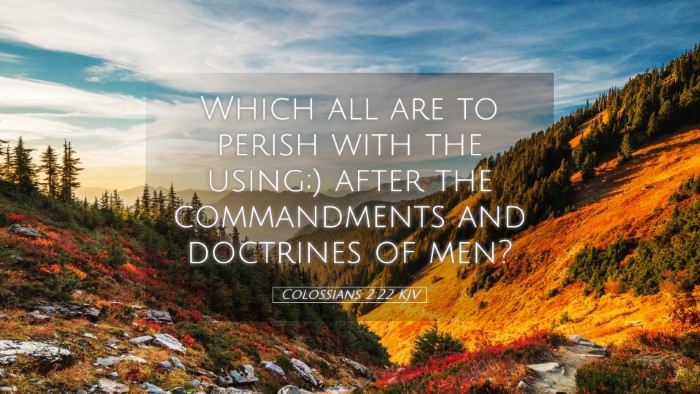Colossians 2:22 - Commentary and Insights
Verse Context: Colossians 2:22 states, "These all perish with the using; after the commandments and doctrines of men?" This verse serves as Paul’s admonition regarding the human traditions and doctrines that could detract from the sufficiency of Christ. This commentary draws from historical insight and theological reflections to aid in understanding.
Historical and Theological Background
The Apostle Paul wrote to the Colossians to confront various heresies that were threatening the purity of the church's teaching. This epistle emphasizes the supremacy of Christ over all philosophies and conflicting doctrines of men.
Insights from Public Domain Commentaries
Matthew Henry's Commentary
Matthew Henry emphasizes the futility of the commandments and doctrines of men that impose restrictions which God never ordained. He notes:
- Human Tradition: Henry underscores the danger in adhering to human-made rules that lack divine authority, suggesting that such rules only lead believers away from the freedom offered in Christ.
- Temporal Nature: He reminds the reader that all things based on human commandments are temporary and destined to perish. True substance is found in Christ alone.
Albert Barnes' Commentary
Albert Barnes provides a practical exposition of the verse, cautioning against the adherence to legalistic practices that detract from the grace bestowed upon believers through Christ:
- Perishing Doctrines: Barnes asserts that the doctrines of men, while potentially well-intentioned, ultimately lead to spiritual death as they stand contrary to the life-giving Word of God.
- Focus on Christ: He stresses the importance of maintaining a focus on Christ, as every human decree can only offer a facade of piety without the transformative power found in a relationship with the Savior.
Adam Clarke's Commentary
Adam Clarke offers a robust theological reflection on the nature of Christian liberty:
- Law and Grace: Clarke emphasizes the transition from the legalistic mindset of the Old Covenant to the grace of the New Covenant through Christ. The verse illustrates the obsolescence of old ceremonial laws when placed alongside the gospel of grace.
- Understanding True Spirituality: He notes that spirituality is not found in the observance of external rites but in the internalization of Christ’s life within the believer.
Theological Implications
The commentary from these scholars sheds light on several key theological implications of Colossians 2:22:
- The Sufficiency of Christ: Jesus Christ alone is sufficient for salvation and spiritual growth. Human doctrines cannot add to or improve upon His redemptive work.
- Freedom in Christ: Believers are called to embrace the freedom that comes from salvation, liberating them from the bondage of legalism and human traditions.
- Caution Against Legalism: Christian leaders and scholars are urged to remain vigilant against teachings that promote legalistic adherence to human commands rather than the grace offered in Christ.
Practical Applications for Pastors and Theologians
In light of Colossians 2:22, pastors, students, and theologians can draw several practical applications:
- Evaluating Church Practices: Leaders should continually assess church practices and teachings to ensure they align with Scripture and promote Christ’s sufficiency.
- Educating Congregants: It is crucial to educate congregants about the nature of grace and the risks of adopting man-made doctrines that can lead to spiritual deceit.
- Encouraging Authentic Spiritual Experience: Encouraging believers to seek a genuine relationship with Christ rather than mere compliance with human dictates fosters robust spiritual health.
Conclusion
Colossians 2:22 challenges believers to reflect on their faith practices and priorities. The insights from Matthew Henry, Albert Barnes, and Adam Clarke remind us of the dangers of human traditions in light of the all-sufficient Savior, urging a return to the foundational truths of the gospel.


